Recruiting research panel participants is a time-intensive process that requires precise targeting to find high-quality respondents.
In fact, our State of User Research data shows that 61% of researchers struggle with the amount of time it takes to find participants. This is especially true when using DIY methods like social media, which often attract unqualified panel members, or email outreach campaigns, which suffer from low response rates.
Panel recruitment services solve these issues by providing researchers with a faster way to build a research panel, ensuring qualified, well-vetted respondents, and reducing the risk of potential fraud.
However, before choosing a service, it is essential to understand that there are two distinct types of panel recruitment services—research recruitment agencies and research recruitment software.
Each has unique strengths, such as the total time it takes to get participants or the size of the panel. The right one for you ultimately depends on your budget, recruiting needs, and research goals.
Below, we’ll explain:
- The two types of panel recruitment services, what they can offer, and how to evaluate them.
- The top 8 panel recruitment services across these two categories to help you find the perfect fit for your research.
Want to attract well-vetted, high-quality participants for your research? Book a demo with User Interviews to access our reliable panel of 6 million panelists.
The 2 types of panel recruitment services
27% of people say they use a third-party research recruitment agency to find participants. But is an agency really the best type of panel recruitment service?
Below, we explain more about what research recruiting agencies do, show you an alternative in research recruitment software, and help you understand which solution might best suit your research needs.
Research recruiting agencies
Research recruiting agencies are full-service firms that specialize in sourcing and managing participants for research studies, including market research, user testing, and focus groups.
These agencies act as third-party partners, taking on the entire recruitment process to deliver tailored, high-quality respondents that meet your project’s specific needs.
You’ll provide them with a target audience based on a set of criteria, like B2B professionals, healthcare patients, or specific consumer segments.
Agencies tend to have larger teams so they can handle the entire process, including identifying niche audiences, conducting rigorous screening through multiple touchpoints (e.g., online surveys, phone interviews), and managing logistics like scheduling and follow-ups.
The downside is that they are usually the most expensive recruitment option, and you’ll likely wait at least two weeks before getting any qualified study participants.
Agencies also charge for every change you make, such as adjusting screening criteria or increasing the number of participants you need. This makes it harder to learn what works for recruitment and limits your flexibility to improve the process.
Because of these downsides, agencies probably won’t be a good fit for teams with tighter research budgets or stricter deadlines.
Research recruitment software
Research recruitment software is a digital, self-service tool that helps researchers recruit participants directly from large, pre-vetted panels using automated features that integrate seamlessly into their workflows.
Dedicated panel management and recruitment tools allow you to dictate the entire research process while giving you access to an extensive database of high-quality participants.
These platforms tend to deliver participants within one business day compared to 14+ days for agencies. With more control over recruitment, you can make changes on the fly to expand your targeting or narrow down your audience for a study.
Not only that, but recruiting your panel on your own is a much more cost-effective solution. In our experience, recruiting through an agency typically costs $3,000 or more, whereas a dedicated platform charges under $100 per participant.
Lastly, you can actually manage your panel of research participants. This approach enables you to communicate directly with participants, which reduces no-shows, facilitates the signing of consent documents more quickly, and ensures that participants remain engaged throughout the study.
Top research panel recruitment software
Research panel recruitment software lets you take control of the recruitment process, offering built-in features to screen, schedule, and manage participants. Below, you'll find the top four choices for teams who want to find panel members faster at a lower cost.
1. User Interviews
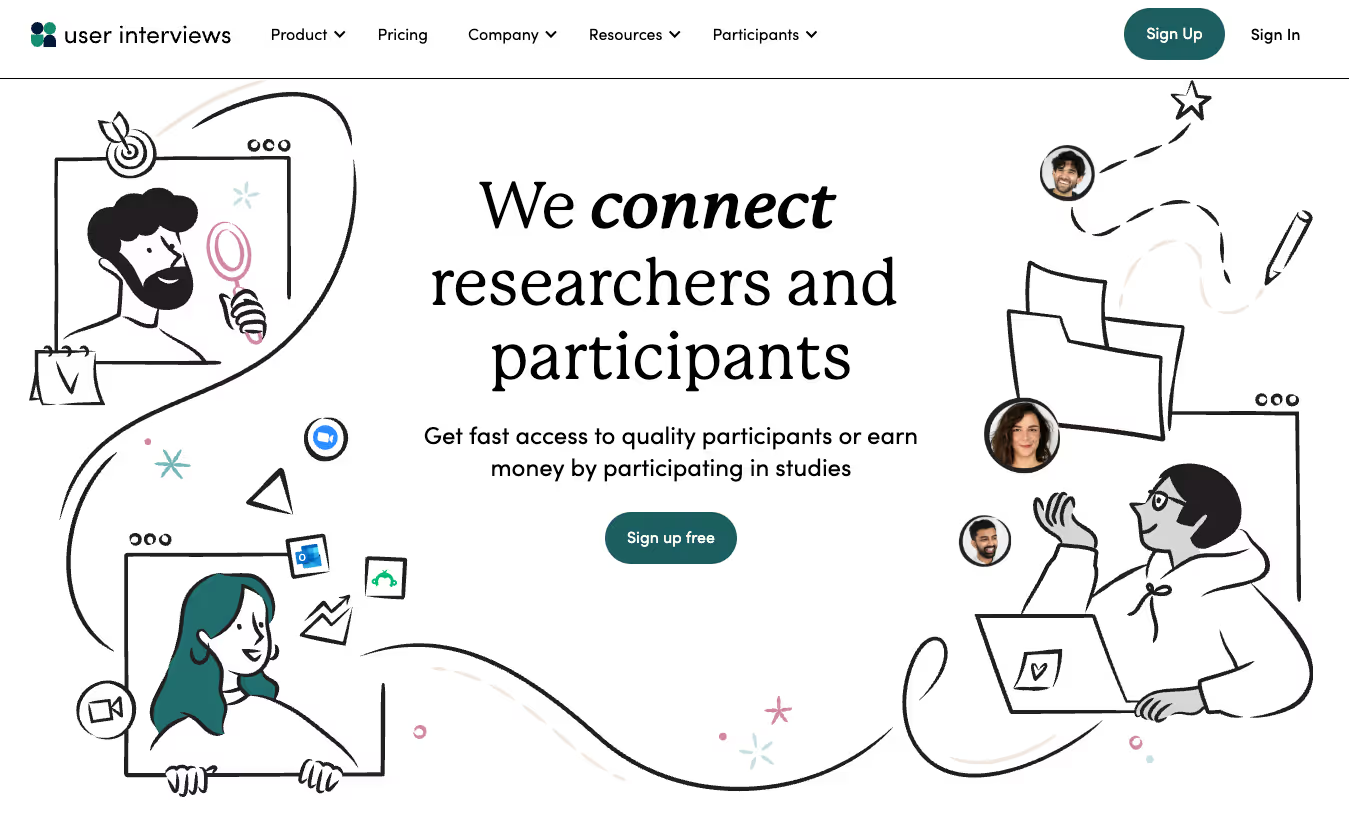
User Interviews is a research recruitment platform built to help researchers source high-quality participants for UX research, focus groups, user testing, and survey panels.
The platform streamlines the process of building and managing research panels with a full suite of panel recruitment and research project management features, including:
- Access to a proprietary panel of over 6 million verified participants for diverse B2C and B2B research projects.
- Advanced targeting filters to segment panelists by demographics, behaviors, or specific research requirements.
- Customizable screener surveys to rigorously qualify participants, ensuring precise matches for your studies.
- Automated fraud detection to protect panel quality by blocking bots and unreliable respondents.
- Incentive management and distribution capabilities to increase participant engagement and retention within your research panels.
- Over 20 integrations for teams to sync key tools to their accounts without disrupting their workflow.
Below, we walk you through exactly how User Interviews works and what makes it the best overall panel recruitment service.
🔭 Take a self-guided tour of our platform and see how easy it is to recruit participants, manage panels, and run better research—all in one place. Explore the Demo Center —>
Access an extensive panel of millions of participants
Many researchers struggle to find qualified participants when recruiting, as the panel provider uses a third-party database.
User Interviews does not rely on any third-party sourcing, handling all recruitment directly. They provide high-quality respondents only with their proprietary panel of 6 million well-vetted participants.
The extensive panel maintains a fraud rate of less than 0.3% while supporting one million sessions. Of those sessions, 99% receive positive feedback, resulting in over $41 million in incentives being processed.
To ensure qualified participants, User Interviews uses a fraud detection model that analyzes 50+ signals throughout the participant lifecycle to verify individuals. On top of that, participant profiles include key data points such as:
- Participant names and contact information (email, phone number)
- Demographic data (race/ethnicity, gender, education level, income level, etc.)
- Occupation data (employment status, job title, industry, etc.)
- Location (city, state)
And much more.
Participants can also verify their profiles individually by connecting their email addresses and social media accounts. This allows researchers to confirm that a participant is who they claim to be, rather than a bot or bad actor.

To maintain high standards, User Interviews performs automated identity checks and re-verification steps to flag suspicious behavior. Researchers can leave feedback for participants (great, good, or poor) after every completed session.
When you leave positive feedback, you have the option to star a user for future studies or follow-up sessions. Any poor feedback results in a follow-up email for more information, and the participant will be flagged, preventing them from being accepted into future studies without further review.
Adjust your targeting filters to recruit panelists who meet your research requirements
Relying on outside sources to recruit panel members can potentially save you time, but one of the issues is the lack of targeting, which tends to lead to broader respondents who don’t suit your research. This results in poor-quality data and skewed results that don’t advance your research outcomes.
With User Interviews’ Recruit, you can adjust who you bring into your panel with over 20 targeting filters, including:
- Demographics: Age, gender, income, ethnicity, homeownership status, living situation, or work setting (e.g., remote vs. in-office workers), etc.
- Psychographics: General interests and lifestyle preferences
- Geographics: Place of residence (country, state, and city)
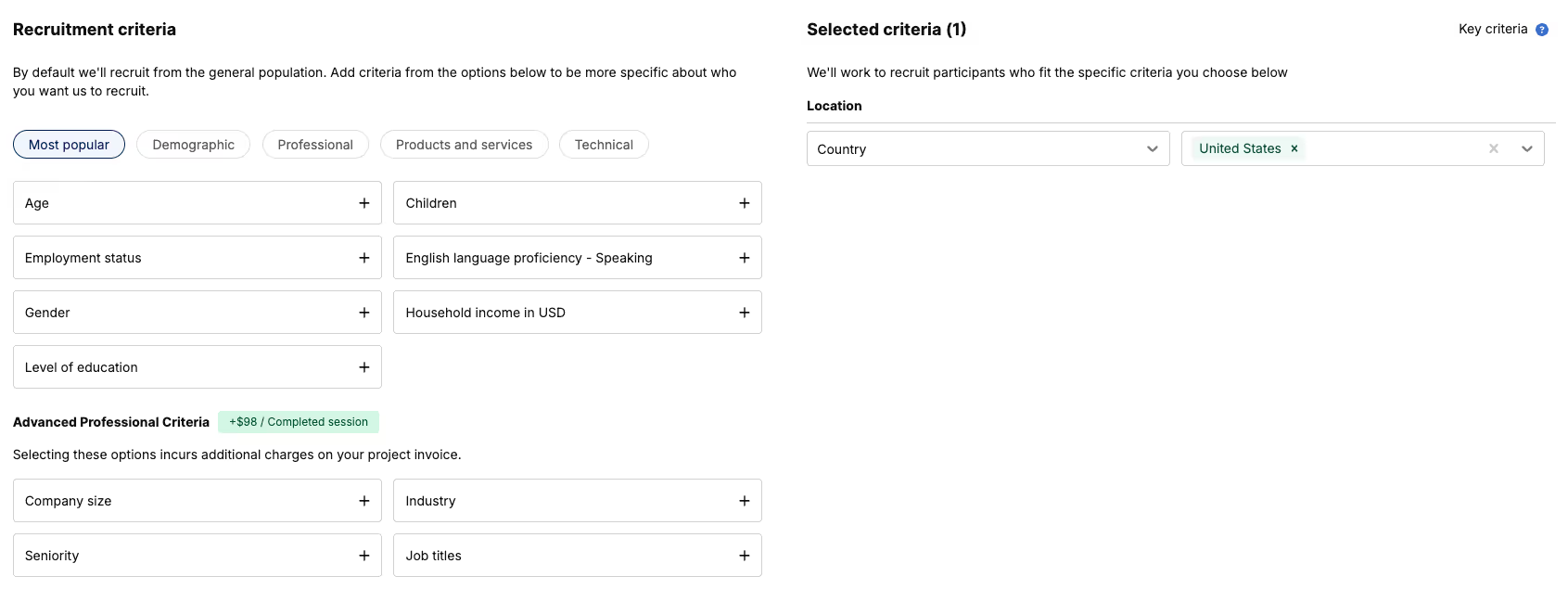
Researchers can recruit for B2B projects with additional filters:
- Job title
- Industry
- Company size
- Seniority
- Skills
- Small business owner status
- Employment type
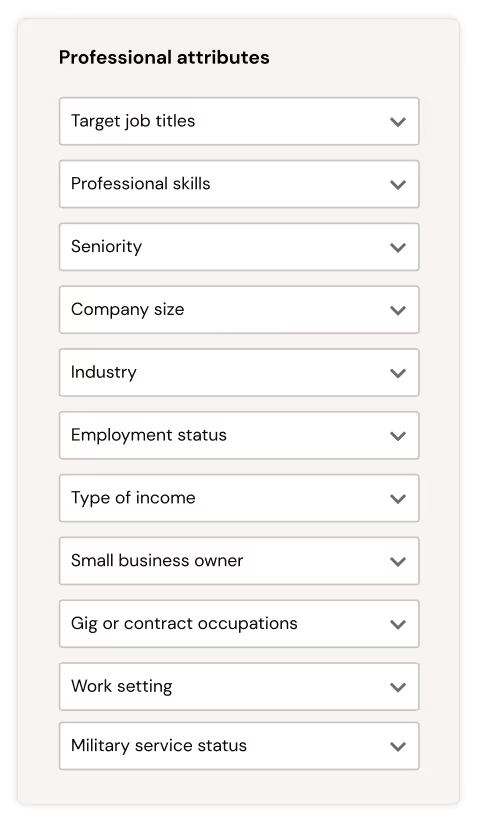
The advanced matching algorithm typically provides you with at least the number of qualified applicants as requested and at least one confirmed session within a day. Within two days, you’re expected to have approved the number of requested study participants.
You can also add custom study requirements. For example, if you’re recruiting healthcare professionals, you can specify, “I need 25% nurses and 75% doctors with 5+ years’ experience,” and User Interviews’ project coordinators will fine-tune recruitment to meet those quotas.
Once you launch a project, you can adjust screener questions, incentives, or participant counts, allowing you to test settings and optimize recruitment based on what works.
Build custom screener surveys to reduce fraud & increase participant quality
Poorly crafted screener surveys often result in unqualified or fraudulent participants being included in your research panels, undermining the quality of your UX studies.
Many panel recruitment services don't include additional screening tools, so you're stuck relying on generic filters that don't thoroughly vet respondents. This results in a pool full of mismatched or unreliable participants.
User Interviews solves this problem with a customizable, drag-and-drop survey builder that creates precise screeners to ensure only high-quality, relevant participants join your research projects.
You can create effective screeners using a variety of question types, including pick-one, pick-any, multi-select, short-answer, long-answer, video-response, or grid (matrix) to mix up your screening methods.
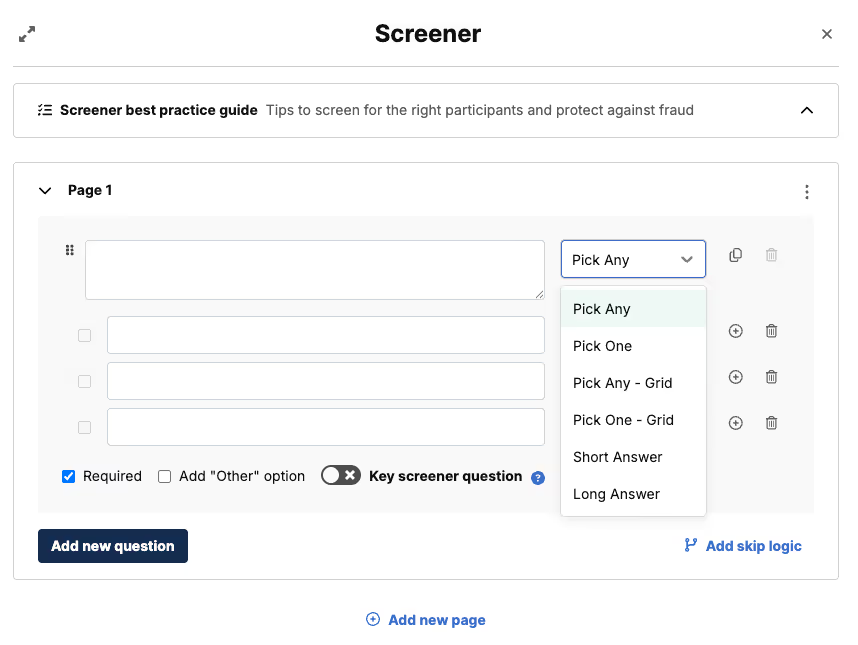
User Interviews also offers various advanced screening features to help you eliminate fraud and boost participant quality:
- Skip logic: Automatically filter out unqualified respondents or guide them through tailored question paths based on their previous answers.
- Premium Screening (double screening): Verify qualified participants via email, phone, or video response to confirm expertise or details, catching inconsistencies early.
- Automatic qualification: Adjust your settings to approve perfect matches to your screener automatically and pre-set targeting criteria. This decreases the time you’ll spend recruiting new people for your panel.
These screening tools ensure your research panels attract verified and engaged participants.
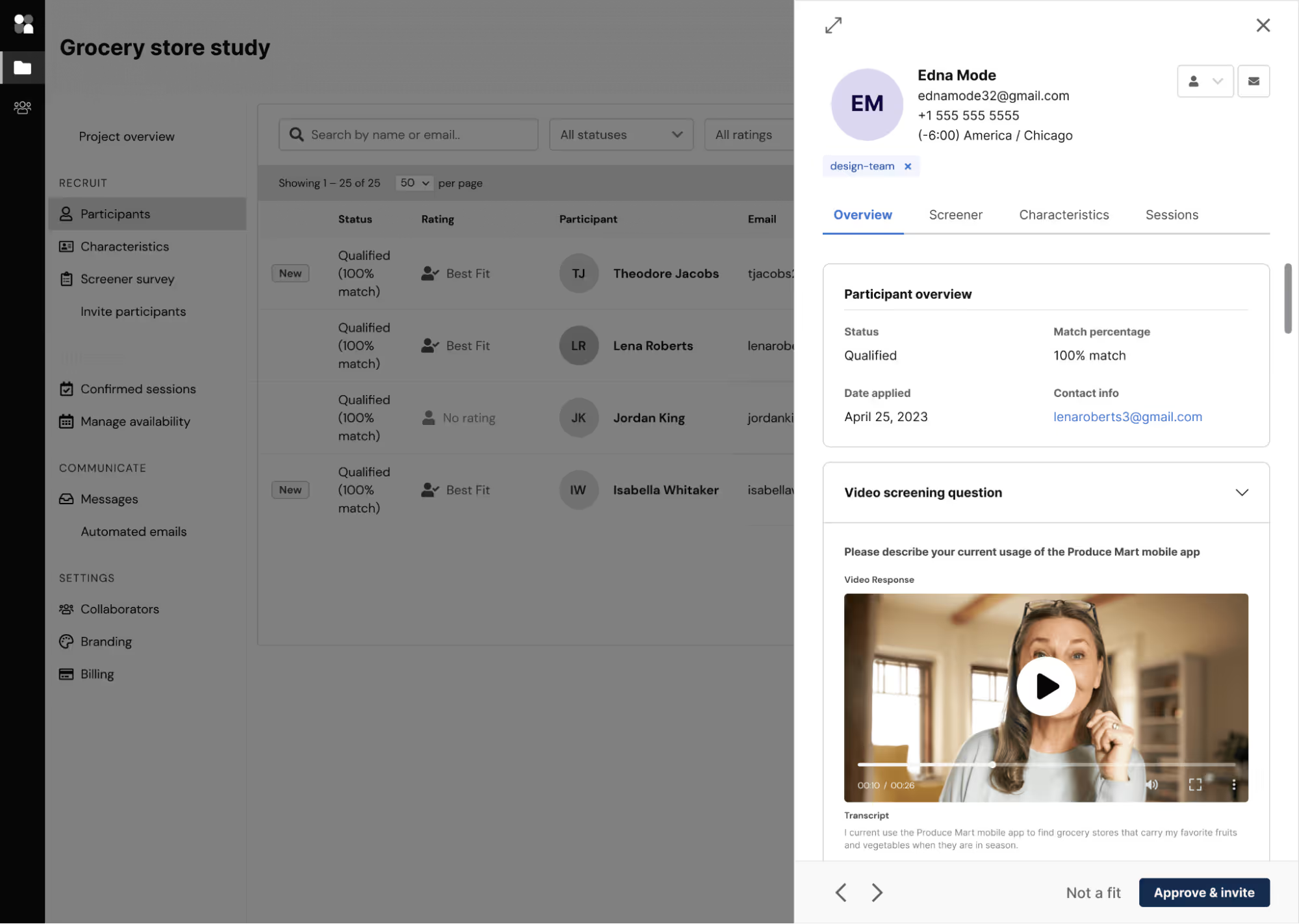
Increase panel engagement with automated incentives
Without compelling incentives, researchers tend to struggle with participant engagement. This results in incomplete responses or disengaged participants that weaken your research results.
User Interviews simplifies this by automating incentive distribution, ensuring panelists are motivated to deliver high-quality input throughout your research. Our platform offers 1,000+ incentive types (including Amazon gift cards, cash rewards, and donations) across 200+ countries.
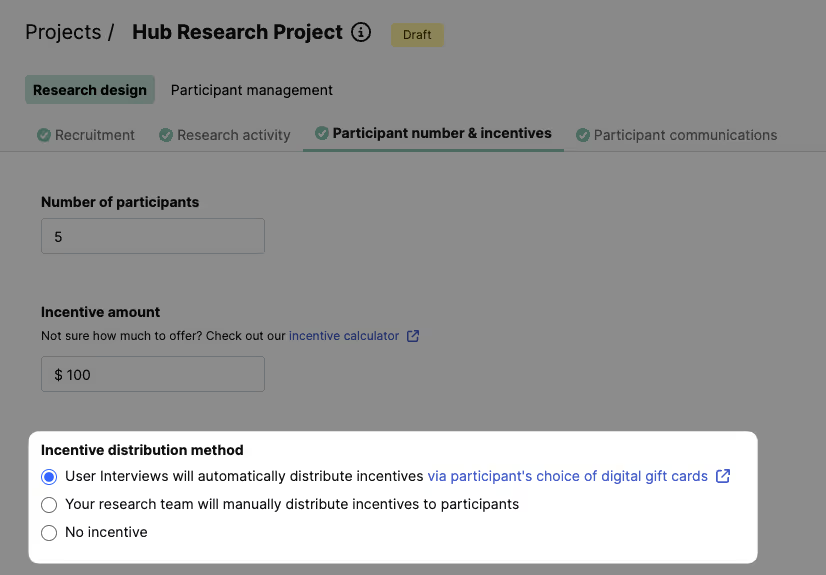
You can choose to reward participants manually or set incentives to send automatically upon study completion. The automated feature ensures quick payouts, keeping participants engaged for future studies.
Not only that, but you can adjust incentive amounts after you've already launched a project. You can raise incentive amounts mid-study to boost participation if response rates are too low.
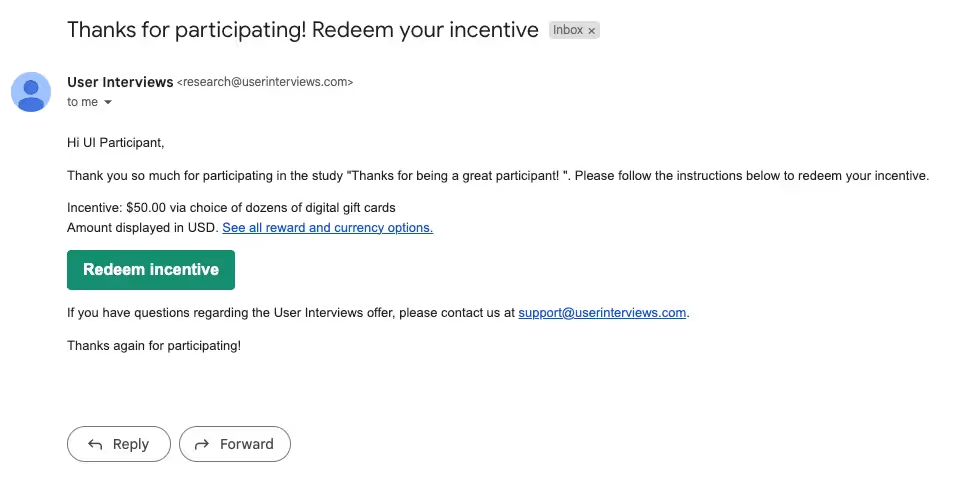
After sending incentives, you can create customizable thank-you emails to let participants know how you feel about their engagement. This allows researchers to gather feedback and nurture panel relationships for future projects.
Book a demo today with User Interviews to start recruiting qualified panelists.
2. CloudResearch
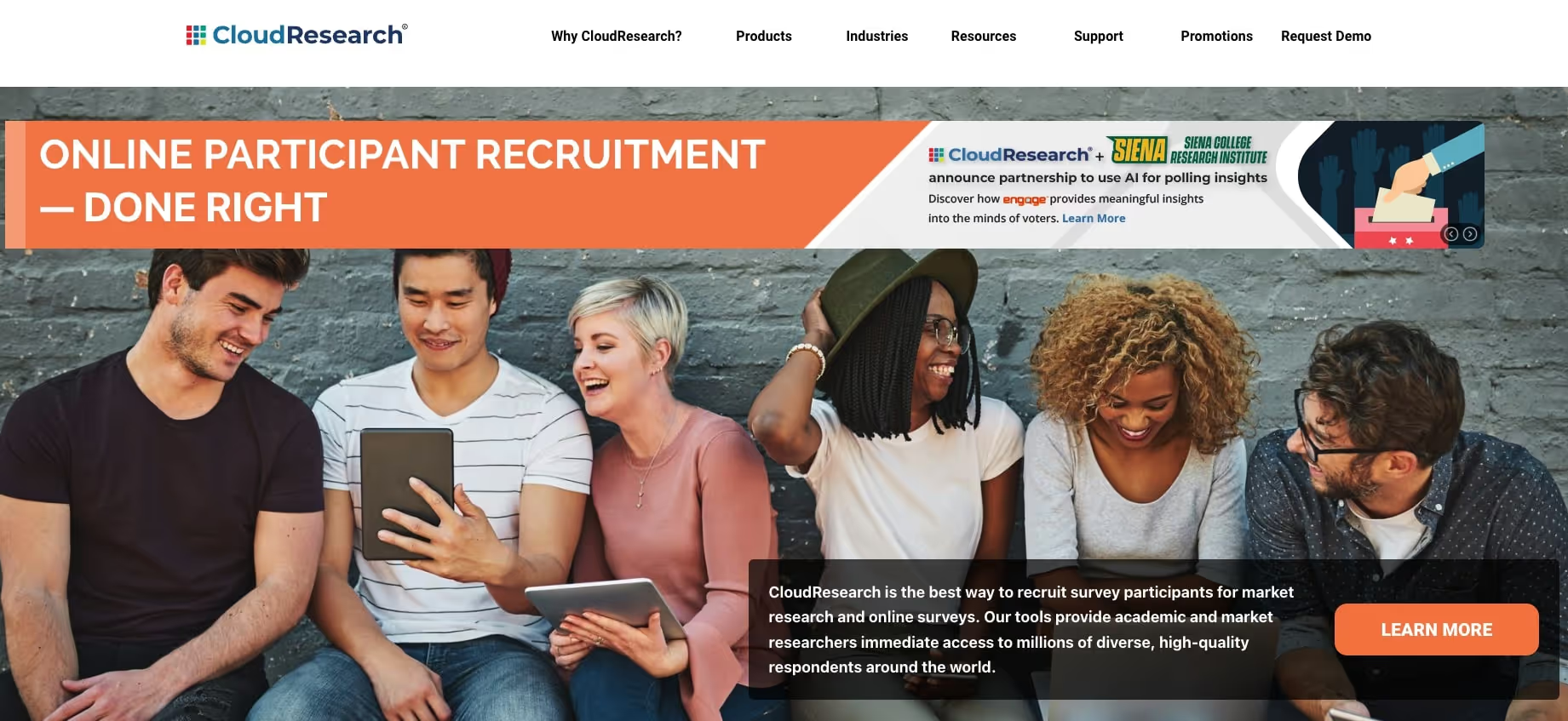
CloudResearch is a self-service platform for recruiting participants for social science, market, and user research studies. With quota targeting, it offers access to over 100 million global respondents via Prime Panels.
Additionally, users can access Sentry vetting to improve data quality and receive support for complex surveys. Pricing is projected based on study size, targeting specificity, and participant incentives.
3. Qualtrics
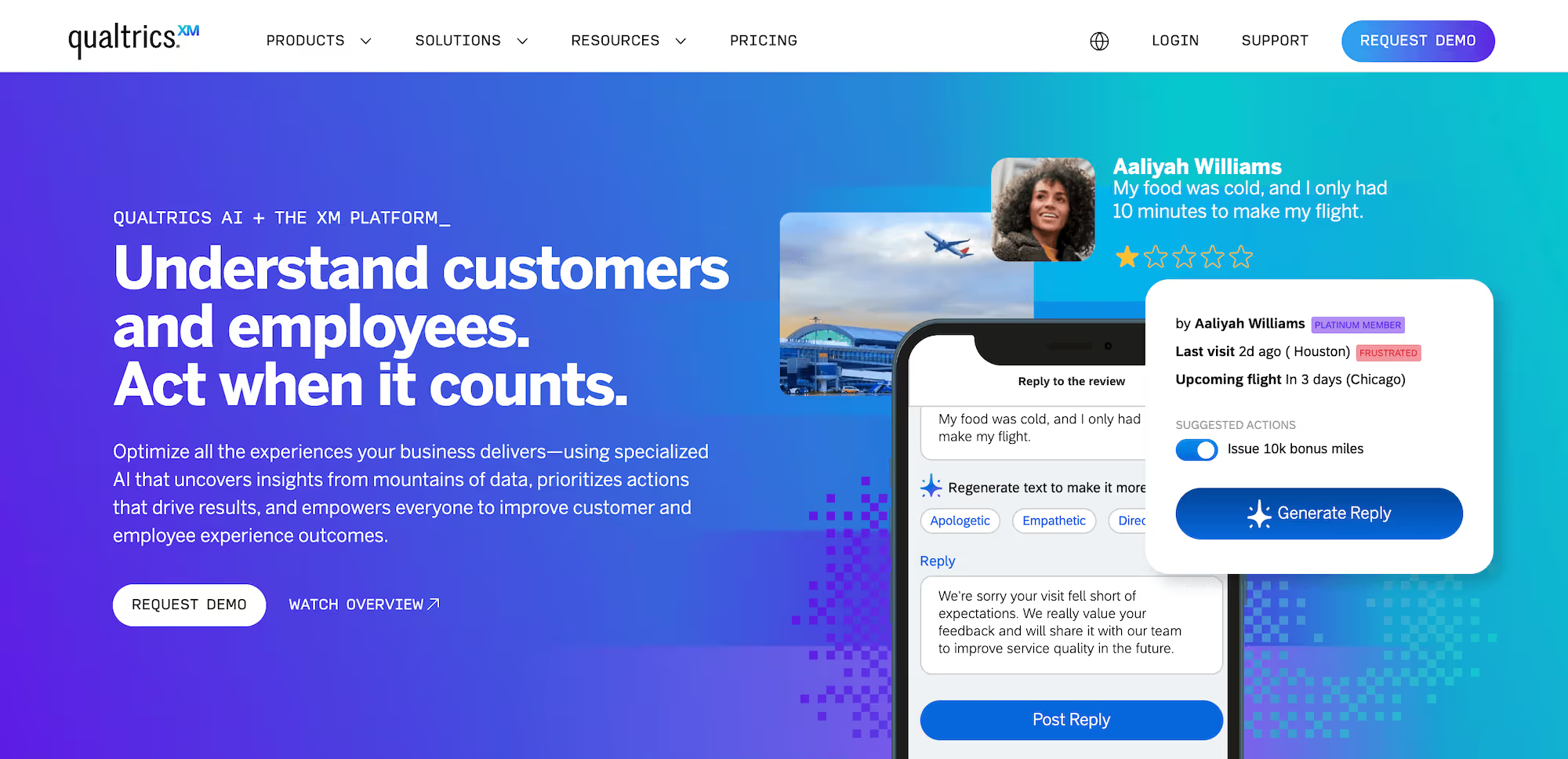
Qualtrics is an experience management platform for recruiting and managing research panels for market, UX, and academic studies. It provides access to 25+ million global respondents or the tools to build your own in-house panel.
Qualtrics also includes automated survey distribution, screener builders, and CRM integrations. You can build basic online surveys for free, but custom pricing plans are available for access to their online panel.
4. Respondent
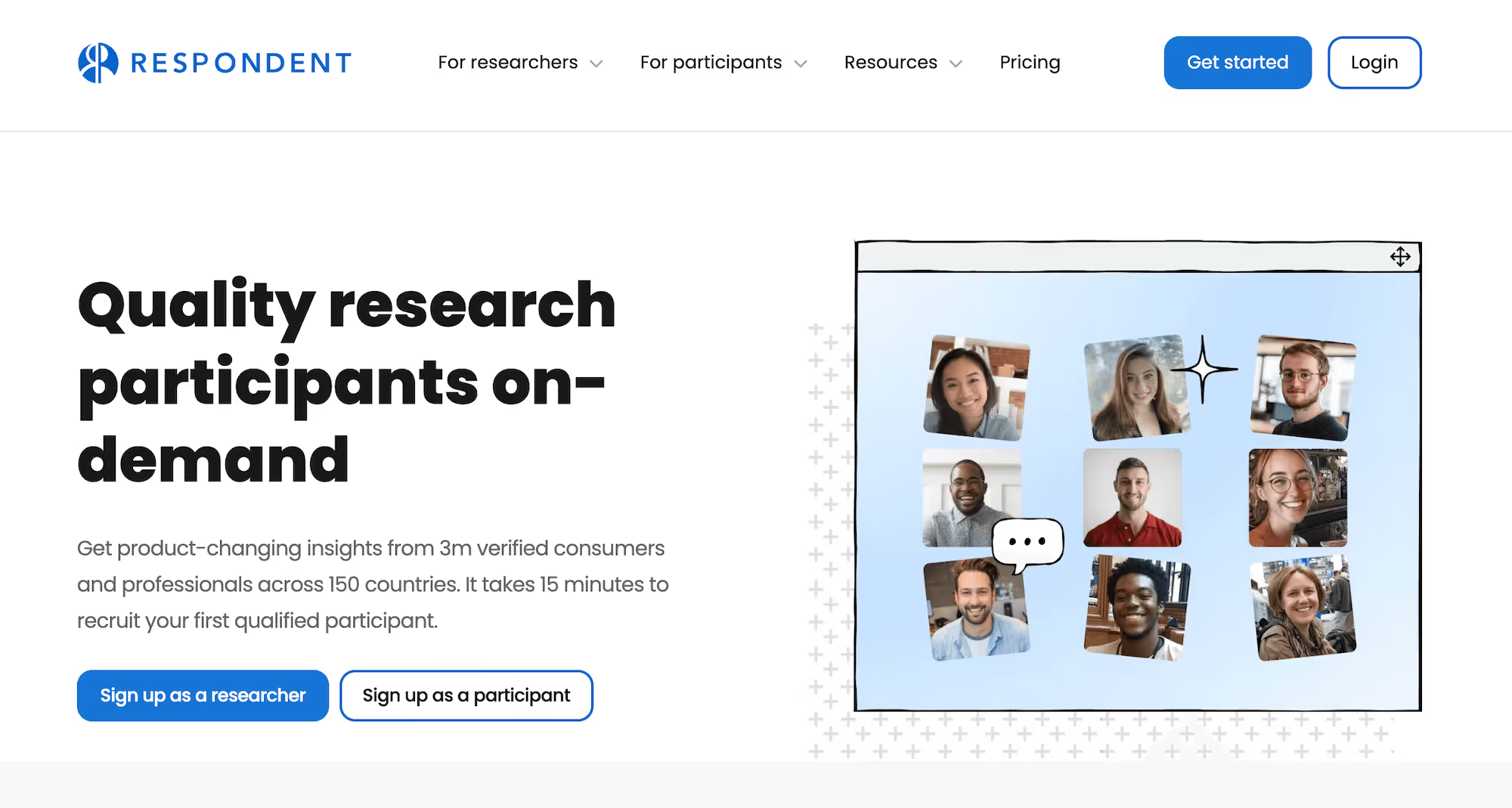
Respondent is a panel recruiting platform for targeting B2B and consumer participants for surveys, in-depth interviews, and focus groups.
It features a pool of over 3 million global participants, professional and behavioral targeting, screener questionnaire builders, and integrations like Zoom for recruitment. Pricing is projected based on a credit system, with costs varying by participant type, study complexity, and requirements.
Top research recruitment agency services
Next, you'll find four top-rated research panel recruiting agencies.
1. Drive Research
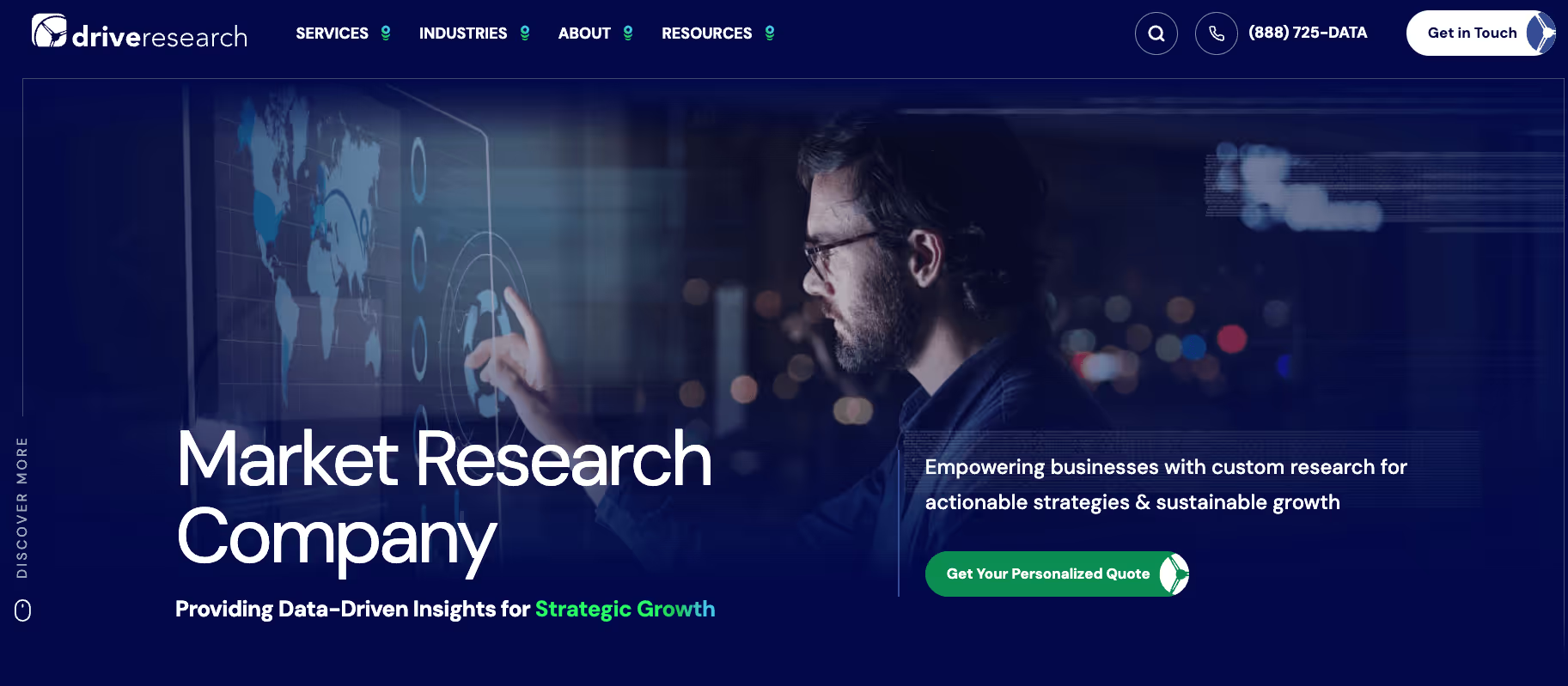
Drive Research is a U.S.-based market research agency specializing in recruiting participants for qualitative and quantitative studies, including focus groups and surveys.
The agency uses multi-channel recruitment (social media, in-house market research panels, and third-party databases) with screening to target niche B2C and B2B audiences. Pricing is project-based, varying by study scope, participant criteria, and recruitment complexity.
2. Sago (Formerly Schlesinger Group)
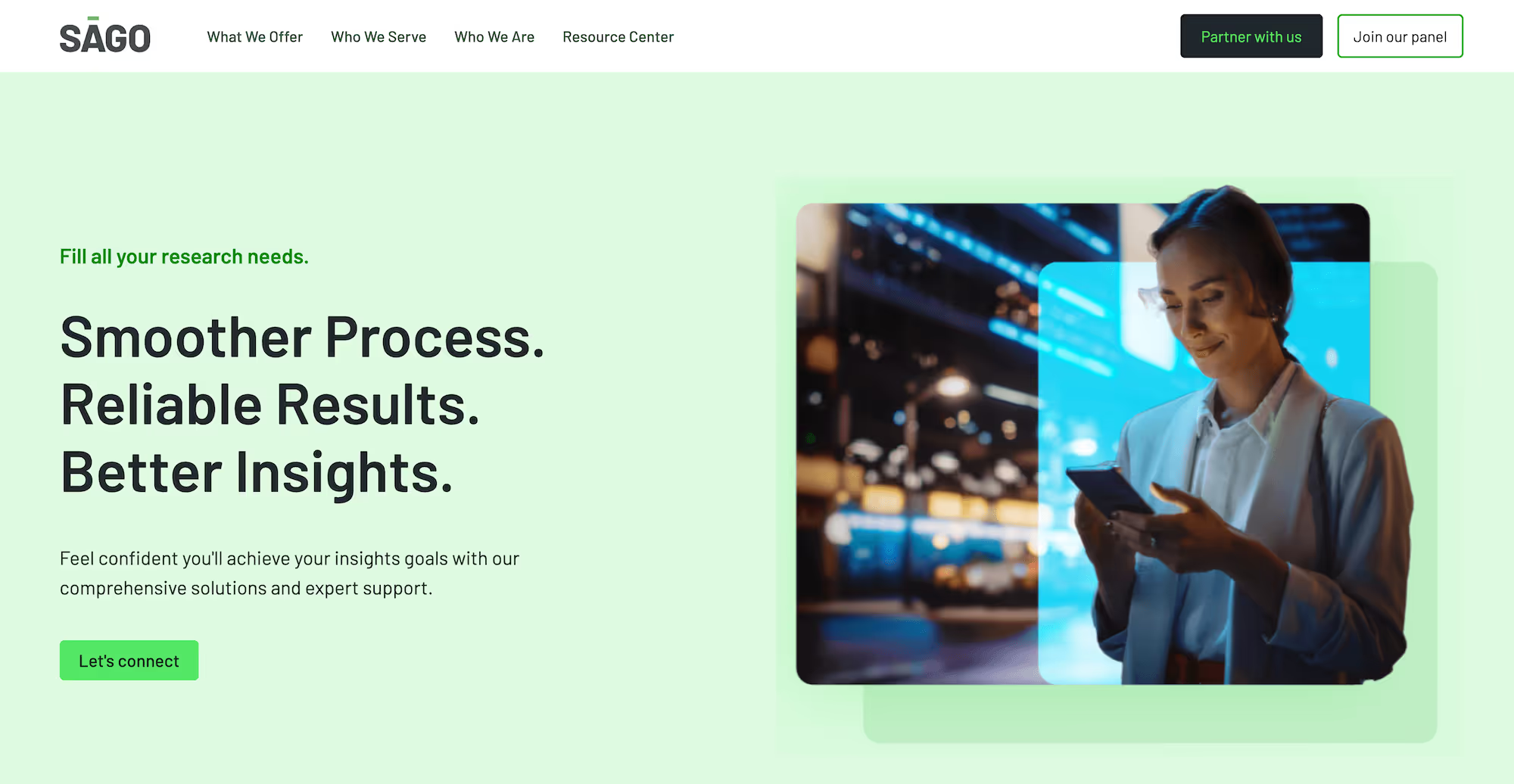
Sago is a global research agency offering tailored participant and community recruitment for qualitative and quantitative studies, including focus groups, interviews, and jury research.
They rely on proprietary panels, as well as web, phone, and in-person methods, to target diverse audiences. Pricing is project-based, depending on study methodology, audience specificity, and geographic reach.
3. inBeat Agency
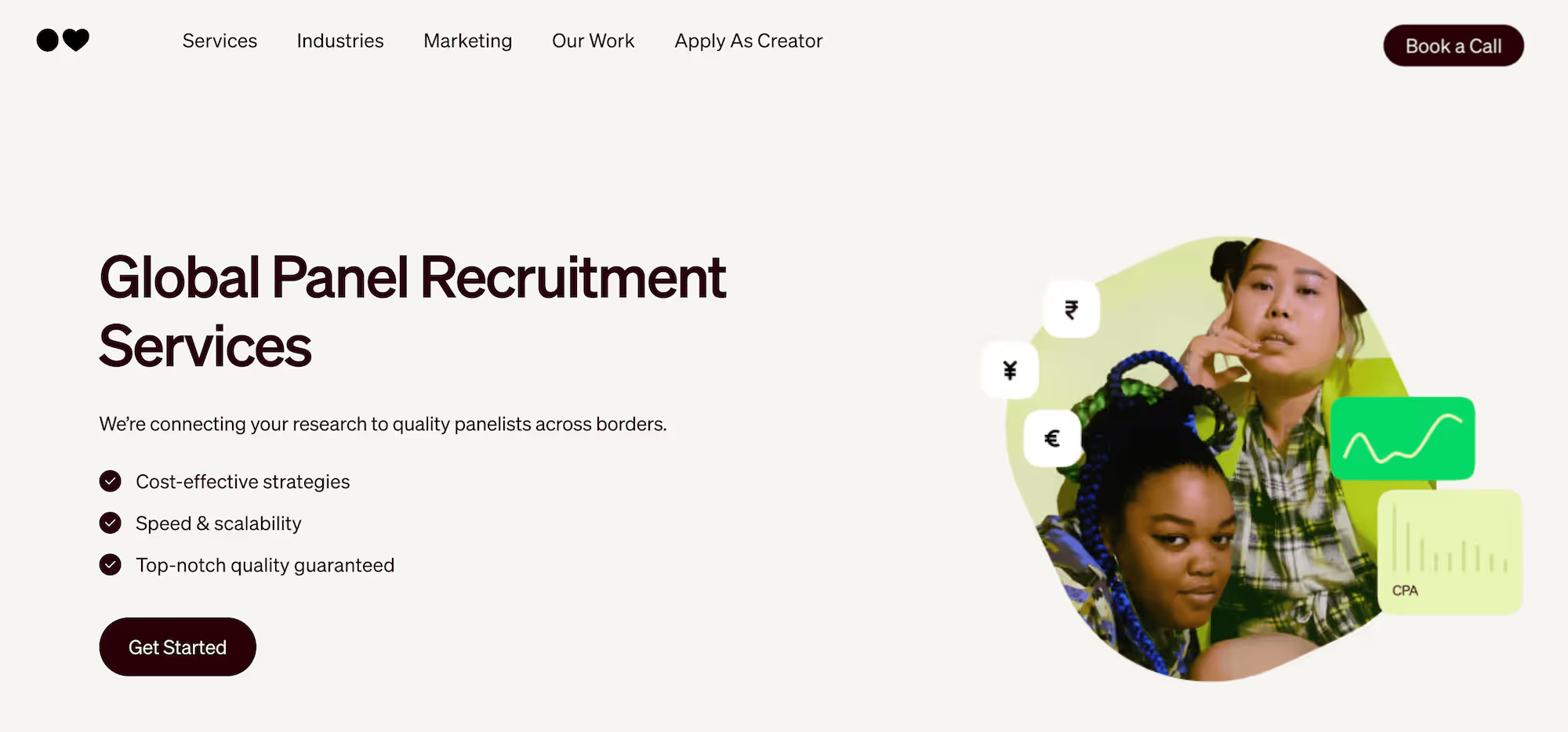
inBeat Agency is a marketing agency that provides research panel recruitment, focusing on sourcing participants for consumer and influencer-based studies.
It offers a customized recruitment strategy through social media campaigns and influencer networks, targeting specific demographics with scalable panel sizes for surveys and user testing. Pricing is project-based, tailored to the study’s scale, targeting needs, and recruitment channels.
4. Panel Recruitment Services

Panel Recruitment Services is an Australian boutique agency specializing in custom panel recruitment for market research, supporting B2C and B2B studies.
The agency builds online research panels and online communities ranging from 100 to over 50,000 participants through targeted outreach and third-party partnerships, with expertise in multi-country recruitment for surveys and community engagement. Pricing is customized to meet your specific needs, which includes your target sample size, participant criteria, and study duration.
Find better, more qualified panel participants for your research with User Interviews
Using agencies to recruit panel members can be expensive and time-consuming, while DIY methods (such as social media or email) can take even longer and yield inconsistent results.
User Interviews solves many of the problems most researchers face when conducting panel recruitment. Our platform offers access to a database of millions of respondents and matches researchers with their requested number of participants quickly (typically within 24 to 48 hours).
Ready to automate your panel recruitment? Book a demo today with User Interviews to learn more.



















